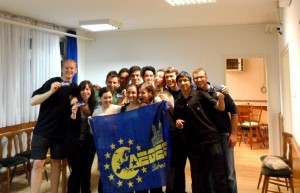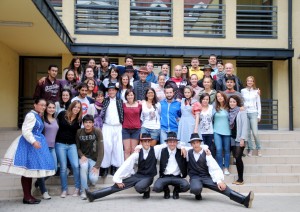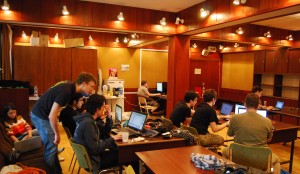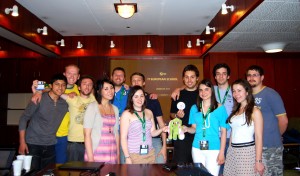This month’s Local of the Month is AEGEE-Debrecen. In the month of May, this Hungarian antenna hosted a well-organised Information Technology European School (ITES). This and regular months of hard work makes AEGEE-Debrecen deserving of the title Local of the Month in July. The AEGEEan interview Balázs Kovács from AEGEE-Debrecen to hear more about his antenna.
Can you inform us a bit about your antenna? How many members do you have? What is special about AEGEE-Debrecen?
An important re-establishment of the currently-operating solid local dates back to 2009 but our antenna was originally founded in 1991 with the help of Dutch students.
AEGEE-Debrecen has around 40 members but the core team of the most active ones is smaller. What we think is special about us is that we aspire to turn our relative shortcoming of having a small team into advantages. Having a small group leaves us with a clear understanding of each other’s competences. Allocating responsibilities and tasks accordingly makes us able to turn each other into real assets for the antenna and for each other.
Another essential thing is the fun element. Although we are creative and challenge-takers, we do not forget about monitoring ourselves and each other from an outsider’s point of view and we have a great sense of criticism. We do not take ourselves too seriously and prefer not to forget about enjoying participation.
Did you expect to become Local of the Month?
We have not even thought about it. It has been a very pleasant surprise.
Last summer you took up the challenge of organising the European School & Summer University.
Indeed. Imagine the first summer ever in AEGEE history when AEGEE Academy encouraged locals to organize a balanced mixture of a European School and a Summer University by merging them into one Summer Event. It was super-challenging for the organizers, trainers as well as for the participants. Yet, “European School: 4 Elements 4 You!” has been an amazingly unique experience for all of us. We rarely visit the same café the first ESSU meetings took place in, but when we do the memories still instantly put us back into that same hyper-enthusiastic mood.
This year we are organising a Travelling Summer University together with AEGEE-Sibiu. “The HungaRomanian Adventure” will be an excellent opportunity for our participants to discover the beauties of two countries: Hungary and Romania. Apart from letting participants discover true Central-Eastern-European hospitality, we will focus on introducing Romanian and Hungarian culture, more specifically by sightseeing and other outdoor activities, by trying traditional cuisine and providing insights into our languages and history. Both Northern-Eastern-Hungary and Transylvania are wonderful and we are all very excited to welcome an exceptionally diverse group of participants here.
Recently you took up the challenge of organizing ITES. Why did you want to organize it and how did it go?
Even though there is a great deal of invaluable personal and professional practical experience one can gain through getting involved in the Information Technology Committee (ITC), it does not belong to the most popular AEGEE bodies in terms of the number of its new members. Two of our local board members are IT students and thought we could contribute to making a change.
Thus, when the Comité Directeur and the ITC issued an open call to find a hosting antenna to organize an Information Technology European School, it came naturally to apply. After our multicultural New Year’s Eve there was time to prepare. The low number of participants also further multiplied the good, cozy team spirit and enthusiasm. We believe that all the opportunities and benefits of working in the field of IT in AEGEE have been clearly presented by our guest trainers, Pavel Zborník and Maurits Korse and we hope that AEGEE-Debrecen has contributed to inspiring potential ITC members. We enjoyed the event and we would gladly do it all over again!
Another big project for Debrecen is the Human Library. Why do you find it important and will you repeat the success?
As a focus area in the Strategic Plan of AEGEE-Europe for the period of 2011-2014, Inclusion of Minorities aims at confronting young people with the reality of minority groups by involving them in direct personal encounters in order to create mutual understanding.
Knowing general local realities as well as witnessing the influence of recent years’ global economic and moral crisis in Hungary, we think that such projects are relevant and should be promoted. With the rise of populism and dogmatic thinking, certain minority groups are often falsely blamed for the common bad. Capitalizing on citizens’ lack of knowledge and an increasing xenophobia is pretty frequent nowadays. We hope that we will be able to organize Living Libraries in Debrecen regularly in the future to promote understanding and respect for diversity.
You also have some members really active on the European Level (EL) of AEGEE. How do you promote the EL to your members? Do you do a lot of work with it?
We consciously try our best in keeping our members updated about all the relevant information on the many opportunities AEGEE offers. Weekly local meetings, info evenings at the university, newcomers’ camps, university-based or city-wide cultural and career fairs and summer festivals – these are the regular events at which we promote our local and international activities face-to-face internally and to the external world too. The fact that we have (former) board members currently active on the European Level (Réka Salamon in Public Relations Committee, Liliána Tóth in Events Committee, Diána Leskó in The Euro-Arab Project and Nóra Abdel-Salam in The AEGEEan) makes things a bit more easy when it comes to promotion.
It is claimed by some that the Hungarian locals doesn’t really work with each other. Does AEGEE-Debrecen do anything to fight this claim?
Although the, locally considerable, geographical distances make it quite challenging to have actual joint projects to work on and realize them together, we follow each others’ activities and help each other if we can. As it is one of the largest locals in the entire Network, we regularly have guest trainers from AEGEE-Budapest at our thematic events and at our Local Training Courses for years now. AEGEE-Debrecen members also frequently attend their events. Sharing best practices and striving for a closer national cooperation have also been among the aims of a recent Regional Training Course of Hungarian antennae organized by AEGEE-Piliscsaba in April.
What lies in the future of AEGEE-Debrecen now?
Hopefully further bright achievements and non-stop enthusiasm will pave the way until we become the Local of the Month again.
Written by Patricia Anthony, AEGEE-København





